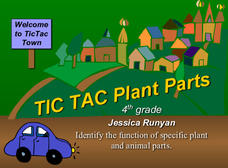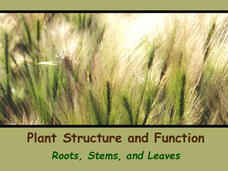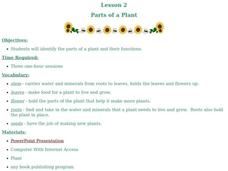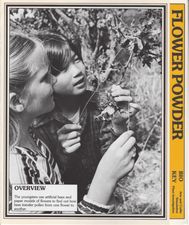Curated OER
Fantastic Flower
Here is a clever activity on pollination of flowers for you. In it, learners study the anatomy of a flower, and play a game in which they simulate the process of pollination. This fine plan brings in elements of art, physical education,...
Curated OER
AP: Chapter 29 and 30: Plant Diversity
It's a jungle out there! That is because of the tremendous diversity among plants. In this AP biology assignment, botanists answer questions about plant evolution, diversity, and reproduction. They differentiate between monocots and...
Curated OER
Flower Structure and Reproduction
In this plant science worksheet, students color and label the different parts of the flower. They write short answers to 14 questions about flowers.
Curated OER
Plant Pollination
Students investigate methods of pollination for various flowers. In this plant biology lesson, students learn the parts of a flower and form a hypothesis about the method of pollination for the flower. They determine the validity of...
Curated OER
Flower Power
Young scholars explore parts of the flower. In this plant biology lesson, students dissect flowers and identify how the seeds are formed. Young scholars take a nature walk to pick flowers for future dissections.
Curated OER
Tic Tac Plant Parts
This plant biology PowerPoint introduces plant parts and their functions. This PowerPoint allows students to identify each plant part on a diagram, along with its' function. The slides contain a clear explanation of how each plant part...
Curated OER
What Parts of a Plant Do We Eat?
Did you know that tomtoes and cucumbers are actually fruits? Biology or botany beginners read about the function of flowers and fruit and find that some food items commonly called vegetables are, by definition, also fruits! Give learners...
Curated OER
Tutti Frutti
Get some competition going in your life science class. Give lab groups a variety of plant parts, all of them fruits, except one. Their mission is to make observations, compare and contrast, in order to be the first to identify the...
Curated OER
Plant Diversity
Here is an all-encompassing overview of the plant kingdom! In this learning exercise, beginning botanists describe characteristics of the four different plant phyla, explain various life cycles, differentiate between monocots and dicots,...
Casimir Middle School
Biological Classification Worksheet
Classify living things with a set of worksheets that has pupils sorting and indentifying living and non-living things. Learners use the worksheets as a basis for finding their answers.
Nuffield Foundation
Investigating Transport Systems in a Flowering Plant
Some weddings have flowers in a unique, unnatural color to match the theme. Young scientists take part in this process to learn about the function of the xylem as they observe colored water moving through a flower. Then, they experiment...
Curated OER
Reproduction in Flowering Plants
Detailing the structures and functions of flowering plants, this slide show will help your students understand the processes and the conditions that allow pollination and fertilization. Labelled diagrams help introduce the reproductive...
Biology Junction
Plant Structure and Function: Roots, Stems, and Leaves
Scientists found fossils of plants more than 420 million years old—but plants existed for up to 100 million years prior to these fossils. Learn about the importance of plants to the entire planet. Viewing a presentation helps scholars...
Curated OER
Flower Power
Students explore the parts of flowers and how they reproduce. They dissect flowers and observe the reproductive organs. Students observe anthers and ovaries of Tiger Lilies under a microscope. They investigate how insects and other...
Curated OER
The Flower and the Fly
It's like a biological "Beauty and the Beast!" The fascinating mutualism between a South African meganosed fly and a deep-throated geranium builds a case study in coevolution for your biology buffs to analyze. After reading about this...
Curated OER
Parts of a Plant
Students identify the parts of a plant and their functions. In this plant biology lesson, students view a PowerPoint presentation on plants and their parts and discuss the functions of each part. Students observe a real plant and...
Curated OER
Mutualism and Co-evolution A study of Flowering Plants and their Pollinators: Biology, Plants
These lessons use a variety of methods and approaches to teach flowering plant biology which includes seed germination; plant growth and food production through photosynthesis; plant transpiration and respiration; sexual reproduction...
Curated OER
Flower Powder
Young scholars collect and observe pollen. In this plant reproduction biology lesson, students use pollen boards to collect pollen from flowers, then match it with the correct paper flowers. Young scholars move artificial bees from...
Curated OER
Plant & Flower Parts
In this biology worksheet, students identify and locate various vocabulary terms pertaining to plant and flower parts. There are 54 biology terms located in the word search.
Curated OER
Flowers: Form and Function
Students recognize and name the parts of a flower. They explain the function of each part of a flower. Students list the steps that occur for sexual reproduction of a plant to take place. They recognize and name the male reproductive...
Curated OER
Flowers and Flowering
In this flower worksheet, students will complete 5 true or false statements about the reproductive process of flowering plants. Then students will label 7 parts of a flower on a diagram.
Curated OER
Flowers and Reproduction
In this plant reproduction worksheet, students review the stages of the reproductive cycle of flowering plants. This worksheet has 1 matching, 1 short answer, and 1 true or false question.
Curated OER
Flower Dissection
Students dissect three different flowers and compare and contrast them. For this flowers lesson plan, students learn about the flower anatomy and then dissect their own flowers.
Curated OER
Plant Transpiration
High schoolers conduct various experiments to investigate plant transpiration. In this biology instructional activity, students explain how this process helps maintain the hydrologic cycle. They measure the rate of water loss in plants...

























